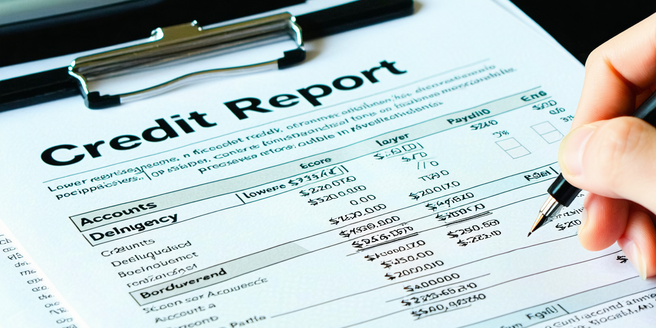
Understanding Bad Credit and Its Impact on Loan Options
| Credit Score Range | Impact on Loan Options | Interest Rate Expectations |
| 300-579 | Limited options, mainly high-risk loans | May exceed 30% |
| 580-669 | Some lenders may consider with higher rates | Typically 20%-30% |
| 670-739 | Qualifies for more mainstream loans | 10%-20% |
| 740-799 | Good credit, eligible for competitive rates | 5%-10% |
| 800-850 | Excellent credit, best loan options | Under 5% |
Key Features to Look for in Bad Credit Lenders
When searching for a lender that accommodates bad credit, it is essential to consider several key features that can greatly impact the borrowing experience. First and foremost, flexibility in terms is crucial. This includes the ability to customize repayment schedules or the option to defer payments. Additionally, transparent fee structures are essential, as hidden fees can significantly increase the overall cost of the loan. Another important feature is the availability of pre-qualification without impacting your credit score, allowing borrowers to understand potential offers without additional credit inquiries. Furthermore, excellent customer service is vital, as borrowers with bad credit may need extra guidance throughout the process. Finally, digital accessibility and user-friendly online platforms can enhance the loan application experience, making it smoother and more convenient. Carefully examining these features can make a significant difference when selecting the right lender.
Top Online Lenders for Those With Poor Credit
For borrowers with a less-than-perfect credit score, finding the right lender can be challenging, but several online platforms specialize in catering to this market. These lenders not only provide loans to those with poor credit but also offer competitive terms and conditions tailored to each individual’s financial situation. Companies such as OppLoans, with its quick approval process, stand out as reliable resources. Additionally, Avant offers personal loans with competitive interest rates and flexible terms for varied credit profiles. LendingPoint is another notable player, focusing on personal loans for borrowers with fair to poor credit. These lenders understand the unique needs of their clientele, often providing educational resources to help borrowers improve their financial health over time. Utilizing these online lenders can be a game-changer for those determined to secure funding despite credit challenges.
How to Compare Interest Rates for Bad Credit Loans
Comparing interest rates is a critical step in securing a fair loan, especially for those with bad credit. Start by gathering quotes from multiple lenders to understand the range of available rates and determine which is the most competitive. Pay particular attention to the Annual Percentage Rate (APR) because it reflects the total cost of borrowing, including any additional fees. It’s also helpful to understand the difference between fixed and variable interest rates and how they might impact your monthly payments over time. Use online comparison tools that allow for an apples-to-apples juxtaposition of offers from different institutions, considering all associated costs. Additionally, consider the loan term, as a longer term may result in higher overall interest paid, despite lower monthly payments. Careful comparison ensures you choose the best rate that aligns with your financial goals and repayment capabilities, minimizing costs over the life of the loan.
Pros and Cons of Using a Co-Signer for Bad Credit Loans
Engaging a co-signer can have significant advantages and disadvantages when it comes to securing a loan with bad credit. On the plus side, a co-signer with a strong credit profile can help reduce interest rates and increase loan approval chances by providing additional security to lenders. This often results in more favorable terms for the primary borrower. However, there are potential downsides. The co-signer assumes joint responsibility for the loan, meaning any missed payments can affect their credit score negatively. Additionally, this arrangement can strain personal relationships if financial difficulties arise. Therefore, clear communication about financial expectations and the ability to manage repayments is essential before deciding on a co-signer. It’s crucial for both parties to understand the risks and responsibilities, ensuring that the benefits outweigh the potential pitfalls in specific situations.
What to Expect During the Loan Approval Process
Navigating the loan approval process with bad credit may seem daunting, but being informed can ease the journey. First, prospective borrowers should anticipate a thorough review of their financial history and current credit report. Lenders may request additional documentation, such as proof of income, employment verification, and possibly collateral, depending on the loan type. Understanding that lenders often weigh credit history, income stability, and debt-to-income ratios can help applicants be better prepared. Following submission, there may be a waiting period while the lender assesses the application, though some online lenders expedite this process. Communication during this time is crucial; staying responsive to lender requests can speed up approval. If approved, borrowers will receive a loan agreement outlining terms, rates, and repayment schedules, which should be reviewed thoroughly for any discrepancies or hidden details. Overall, preparation and transparency are key.
Tips for Improving Your Credit Score Over Time
Enhancing your credit score is a rewarding journey that involves careful planning and consistent effort. One of the most effective strategies is making timely payments on all debt obligations, as payment history is a significant factor in credit scores. Additionally, reducing outstanding debt and avoiding maxing out credit limits can positively affect your credit utilization ratio. Diversifying your credit mix can also be beneficial, as it demonstrates the ability to manage different types of credit responsibly. It’s important to periodically review your credit report for errors or discrepancies and dispute any inaccuracies with credit bureaus. Establishing long-term positive credit habits, such as setting up automatic payments and keeping accounts open to build a lengthy credit history, will gradually elevate your score. Over time, these actions can lead to better lending terms and financial opportunities.
Alternative Lending Options for Bad Credit Borrowers
For individuals facing challenges with traditional loans due to bad credit, alternative lending options provide viable solutions. Peer-to-peer (P2P) lending platforms have gained popularity, connecting borrowers with individual investors who are more flexible regarding credit standards. Additionally, credit unions often offer more personalized loan services with affordable rates, even to those with lower credit scores. Secured loans, which require collateral, present another alternative by reducing lender risk and potentially offering advantageous terms to the borrower. Payday loans, though accessible, should be approached cautiously due to their high rates and risk of spiraling debt. Microloans, often provided by nonprofit organizations, are also worth exploring. These options expand opportunities for borrowers to access funds while working to improve their credit standing.
Precautionary Steps to Avoid Loan Scams
In the world of lending, especially for those with bad credit, being vigilant against scams is crucial. Start by verifying the lender’s credentials. Ensure they have a legitimate physical address, contact information, and are registered with relevant regulatory bodies. Be wary of lenders who solicit loans via unsolicited emails or phone calls, requesting upfront fees before approving a loan—this is often a red flag. It’s vital to read customer reviews and seek recommendations from trustworthy sources. A bona fide lender will provide clear terms and conditions without pressure tactics. Guard your personal and financial information; do not share sensitive details unless you’re confident about the lender’s legitimacy. Trust your instincts; if an offer seems too good to be true, it probably is. These precautionary measures can safeguard against potential financial traps.
Frequently Asked Questions About Bad Credit Loans
For borrowers navigating the world of bad credit loans, numerous questions often arise. Understanding how credit scores affect loan eligibility is a primary concern, as it influences terms and interest rates. Many wonder about the role of collateral and if it can bolster approval chances, even with a poor credit profile. Questions about potential fees, both upfront and hidden, are prevalent, as these impact the loan’s affordability. Borrowers are also curious about the effects of a co-signer and whether they can significantly alter loan conditions. Another common question involves the possibility of refinancing as credit improves, offering a chance at better terms. Finally, borrowers seek advice on dealing with predatory lenders and recognizing potential scams. Addressing these FAQs helps demystify the lending landscape, empowering borrowers to make informed, strategic financial decisions.

